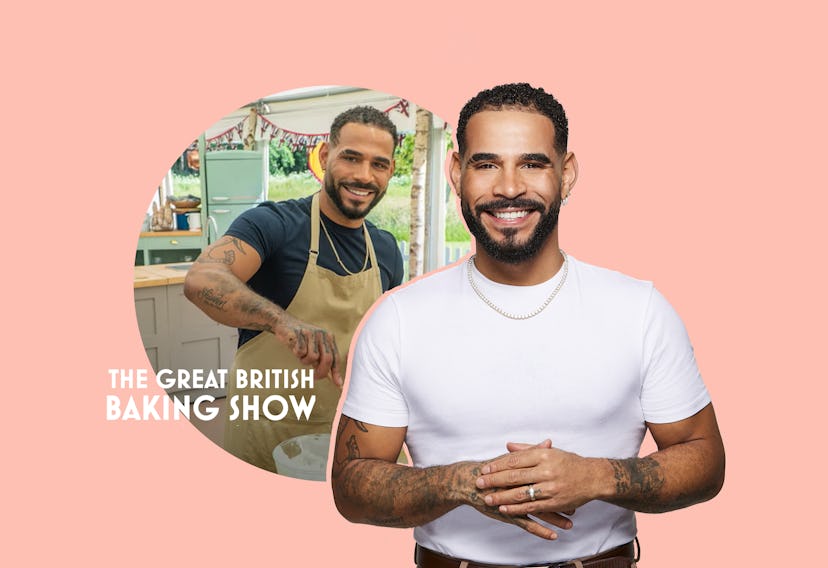TV & Movies
What It’s Really Like On The Great British Baking Show
Season 13’s runner-up, Sandro Farmhouse, pulls back the curtain on casting timelines, roving cameras, and more.

The “shaky floors” of The Great British Baking Show gazebo still haunt Sandro Farmhouse. “It’s something you don’t see on TV,” he says. “I had to ask the crew to stop bumping around my station.”
If you’ve watched the competition show at least once in its 14 seasons, you know that one wrong decision — or clumsy move — can crumble a confection. Farmhouse was one of 12 amateur bakers who competed in Season 13 to impress head judges Prue Leith and Paul Hollywood, an experience he calls a “dream come true.”
Season 14 premiered Sept. 29 on Netflix, with a new slate of 12 contestants who will be chasing their dreams. (New episodes drop every Friday.)
Bake Off, as it’s often referred, has had an enduring appeal since its 2010 debut and is reliably one of the U.K.’s most popular TV shows, helping propel contestants into careers post-filming. Farmhouse, who was Season 13’s runner-up, was recently appointed Resident Baker on the U.K. daytime show Lorraine.
“Life after the show has really been something,” he tells Bustle from London. In addition to Lorraine, he’s been able to expand on his 2019 initiative, Baking On The Spectrum (BOTS), which empowers autistic children and their families through baking.
As a recent Bake Off alumnus, he’s intimately familiar with the inner workings of the show, and shared some candid behind-the-scenes details with Bustle, from casting timelines to the surprising advice producers give contestants when filming’s wrapped.
The Casting Process Is Long
What does it take to get on the show?
You start by simply applying for the show online. I recommend the option to submit a video with your application. It allows you to show off your personality. If producers like what they see, they’ll call you for an informal chat.
From there, producers spoke with me over Zoom and asked me to bake and present something on the video call. I must’ve done pretty well, because I was invited to meet with them in person and in front of cameras. They had a kitchen set up, and I was asked to bake alongside some professionals. It felt like a test run of the show.
After a mental health assessment, I was told I’d made it on. It’s a long process. My first phone call from producers was in November 2021, and I didn’t know I was on the show until six months later.
How do contestants prepare for the show?
A few days after finding out I’d be on [the show], they sent me a ton of information, including recipe briefs for the signature and showstopper challenges. They didn’t send us any briefs for the technical challenges though. We had around four weeks to prepare, and if you made it through to the finals, you were only given four days to prepare. It was intense.
The Cameras Bring On The Pressure
When does a typical day of filming begin?
Contestants woke up at roughly 6 a.m. We all stayed in a hotel — I can’t reveal the name because they use the same one each year. In the morning, we’d all meet downstairs in reception around 7 a.m. and leave on a minibus to Welfare Park, where the show is filmed. Before cameras started rolling, we’d have breakfast on site and then head into the tent.
What happens once you’re in the famous tent?
A food technologist came in to help prepare all the ingredients and ensure we had everything we needed for the challenges. This would happen for each challenge apart from the technical, so there was a lot of waiting around — and it is cold in that tent.
Filming would begin around 8 a.m., and a standard day took eight to 10 hours. Between all the baking and judges’ critiques, we also had to chat with producers about what we were actually baking and film reaction shots for them to use in the show. I remember staring into the camera for like five or 10 minutes, and they ended up using like two seconds of that footage.
Producers also took our phones away during filming, but we were allowed them back once we left the tent.
What was the most difficult challenge to film?
I would say bread week. Other than Halloween, I didn’t really care for the themed weeks, especially the Mexican-themed challenge. I heard the new series is taking things back to basics, which I would’ve liked.
What is it like filming with the hosts and judges? How often do you interact with them?
They’re in and out of the tent. They film their critiques and the results, and then head off to wherever they chill out on set. Contestants also interact with them outside of filming, though, and they’re very supportive.
What are some challenging aspects of filming viewers don’t get to see?
The pressure of having cameras on you when you’ve messed up a recipe. If you look up from your station and suddenly they’re surrounding you, you know you’re screwing something up. [Laughs.] Luckily, I got used to that pretty quickly.
Curb Your Expectations Post-Filming
What happens after the show has wrapped?
We’re asked to keep super quiet about everything, especially the final. Nobody likes spoilers.
Producers also told contestants not to expect to become anything after the show. They made it clear that Bake Off isn’t a place to seek fame. You’re there to bake and make people happy, and that’s what we did — so people shouldn’t go into that show with any expectations. But if success happens for you afterward, then go for it.
This interview was edited and condensed for clarity.